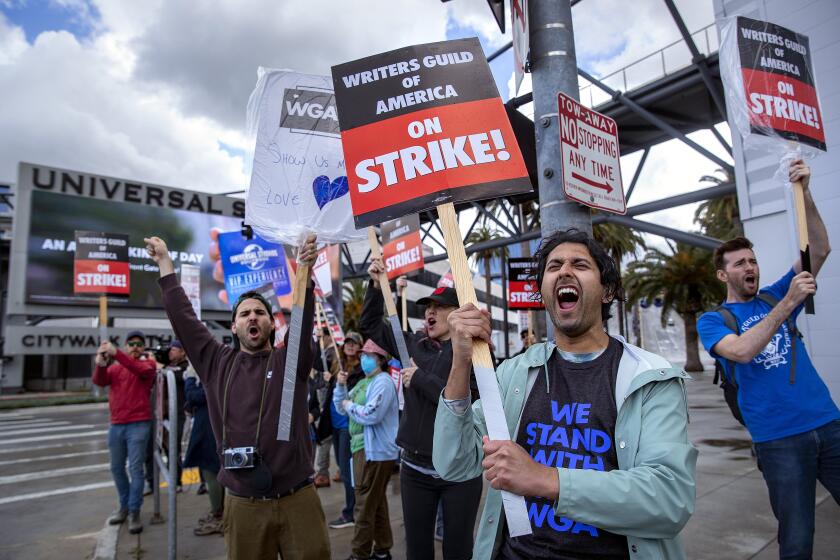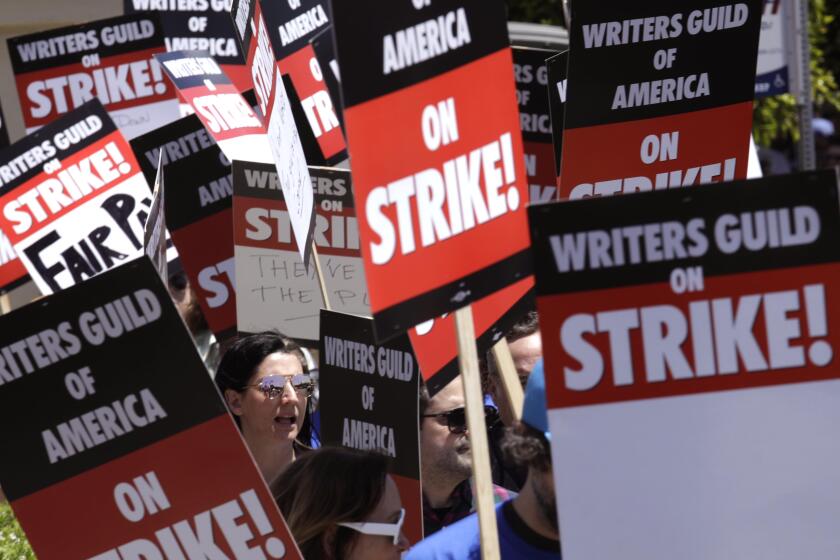Column: Streamers profited when ‘the idiot box’ became art. They forgot writers made it that way

- Share via
There is nothing pretty about a boom town gone bust, nothing fun about finding out that, once again, the people who profited most from a golden age are not the visionaries, the explorers or the workers, but the merchants.
On Tuesday, members of the Writers Guild of America went on strike.
Largely because television no longer provides a living for many of the people who write it.
Hollywood writers formed picket lines in L.A. and New York after the Writers Guild of America called a strike for better pay and working conditions.
For those of us who’ve watched TV grow from the unfairly derided “idiot box” to become the preeminent art form of the 21st century, such a development seems at once completely absurd and tragically inevitable.
Ten years ago, American television was in the midst of an explosion — the good kind. Premium channels had made “Game of Thrones” and “Homeland” into water cooler hits. Pretty much every basic cable channel under the sun had followed AMC’s “Mad Men” into the prestige-TV business — the History Channel had just won five Emmys for “Hatfields & McCoys,” for heaven’s sake.
Broadcast networks might have been worried about the competition, but their top series still pulled in 10 million to 12 million viewers each week, and “Scandal” had leveraged Twitter to redefine the term “audience engagement.” Netflix, growing fat as a secondary platform for the newly ignited industry, had just committed to original content with “House of Cards,” and Amazon was making its move by offering Prime subscribers the chance to “vote” on a slate of pilots.
In the days before the Writers Guild of America called on members to strike, the creators of hit shows, including ‘Shrinking,’ ‘The Last of Us’ and more, gathered to discuss the state of the industry.
Little did we know that streaming was about to bring the whole thing down.
It wasn’t just a Golden Age — it was a bona fide gold rush. Suddenly, television was drawing talent from the big screen, book publishing and Broadway; Hollywood had not seen so many playwrights and novelists pitching projects and hanging around its hotel pools since talkies were invented.
(Memo to New York: The playwrights may be coming back.)
The tyranny of ratings had been overthrown by a more populist and, frankly, mysterious system of success, one that involved indicators old — Emmys and magazine covers — and new — recap culture, TV blogs, Comic-Con, social media and, eventually, Netflix-ian algorithms.
And at first, no one appeared to benefit from the efflorescence more than the writers.
Hollywood writers on Tuesday formed picket lines in L.A. and New York after their union called a strike to demand better pay from streaming, as well as improved working conditions.
Though television, unlike film, had always been a writers medium, with creators and showrunners, not directors, calling the shots, it was the rare (and highly devoted) viewer who could name a series creator, never mind who wrote their favorite episode.
But as television became the most talked-about art form going, writers found themselves being hailed by name — Matthew Weiner, Vince Gilligan, Shonda Rhimes, Ryan Murphy, Jenji Kohan, Damon Lindelof, Michelle and Robert King — and treated with the rock-star status once reserved pretty much solely for Norman Lear and maybe David Chase.
More important, writers who had not worked for HBO, Showtime or FX felt liberated from the Nielsen ratings, censors, executive notes and 20-plus episode seasons that dominated the broadcast networks. Having won the recognition of digital rights in the 2007 strike, writers began singing the praises of basic cable networks and, later, streaming services that finally let writers write.
They were thrilled to find platforms that allowed stories to be told organically rather than stretched out by reminders of what had happened in previous episodes and framed by the needs of advertisers and a pre-ordained season construct.
And viewers followed. Even the most crusty I-only-watch-PBS television-deniers bought into the wonder of it all. Television had at last ditched its (unfair) reputation as mindless dross; the people who sold television at least seemed to understand how limitless the art form could be.
Streaming has transformed television and led to a surge in content, but it also has squeezed Hollywood writers. Five Writers Guild of America members share their stories.
Some of us did worry at the time whether the rush would last. Though scarcity has long determined value, the new business model, particularly on streaming services, seemed deeply attached to surplus despite the lack of advertising dollars. As early as 2015, FX Networks Chairman (and informal Mayor of Television) John Landgraf announced that we had hit “peak TV” — only for the number of series and streaming platforms to continue to multiply.
Where, many wondered, was all the money coming from?
Much of it, as it turns out, was coming from the writers. While the merchants of streaming made billions (some of which they chose to spend unwisely), many of the people who wrote the series that created TV’s latest Golden Age were seeing their remunerative gold turn into silver. As in 1849, some writers struck it rich, accumulating success and landing deals that turned them into multimillionaires. Most, however, did not.
Most discovered that liberation from traditional network series came at a substantial and quantifiable cost.
Especially on streaming services, including those later created by broadcast networks to compete with the 49ers of Netflix, Amazon and Hulu.
It’s still unclear how many more productions will stop work; however, shows like ‘Ghosts’ and ‘Grey’s Anatomy’ will finish out their seasons.
A loss of residuals, shortened seasons, smaller writers rooms, commissions for entire seasons that were never made turned the boom to bust. For many TV writers, getting a full-time job in their chosen profession became even more difficult than it had been before television took over the world.
It is deeply unfair and, more critically, unsustainable. Streaming exists only because television became a wonder of the modern world. And that happened because it drew some of the most talented, visionary writers and offered them a chance to tell the best stories they could.
That will not continue if studios and streaming platforms expect established writers to work as spec script-writing freelancers, while offering spec script-writing freelancers no chance of becoming established writers. Too often, writers find themselves dismissed before a show even goes into production, depriving them not only of wages but also the opportunity to see how television is actually made, which in turn limits their ability to progress up the career ladder.
Streaming leveraged television’s Golden Age to change the world. But unless we want TV’s boom town to become a ghost town, we need to protect the writers who built it; there’s still gold in them thar hills, but it doesn’t matter much if there’s no one to do the digging.
More to Read
Inside the business of entertainment
The Wide Shot brings you news, analysis and insights on everything from streaming wars to production — and what it all means for the future.
You may occasionally receive promotional content from the Los Angeles Times.











